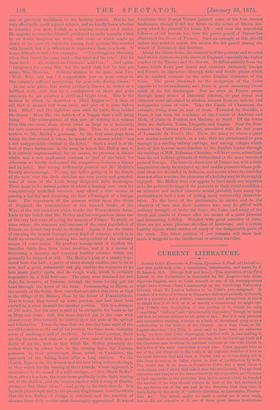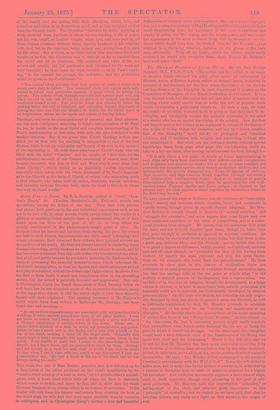CURRENT LITERATURE.
loannis Coleti Enarratio in Primam Epistolam S. Pauli ad Corinthios ; now first published, with a translation, introduction, and notes, by J. H. Lupton, M.A. (George Bell and Sons.)—This exposition of the First Epistle to the Corinthians is translated by Mr. Lupton—into clear, vigorous English, such as Colet himself or one of his contemporaries might have written—from a manuscript in the Cambridge University Library, which Mr. Lupton believes to be Colet's own autograph. It consists of a series of lectures or discourses delivered probably at Oxford, and is a practical, not a critical, commentary and paraphrase, at times so ample that if we look at it as merely a commentary we might em- ploy Colet's own description of one portion of it, which ho calls "rambling," "diffuse," and " interminably digressive," though we must add that he always returns to his point at last. But it is very pleasant and instructive reading, whether as a book of devotional piety or as a contribution to the history of the Church. At a time when, as Mr Lupton observes, " the Bible is often said to have been an unknown book," we here find Colet thoroughly familiar with it, and making it familiar to those he addresses, and showing how its teachings could aid the Christian man to attain to habitual holiness of life with Christ in the midst of the utter corruption around him. Colet appears here as one of the last witnesses to the truth of the Catholic doctrine of love as the bond between God and man in Christ, just as it was dying out in this form to revive in fuller vigour in that of justification by faith. The world was in no sense a Cosmos to Colet, but a mere chaos of wickedness, out of which God called men into his Church. The spiritual character and temper of the man evinced by this exposition are the same as find expression in the provision that in the school which he founded the number of the boys should always be that of the fish enclosed in the net drawn out of the sea, and in the direction that they were to learn Latin by the study of "authors Christian, as Lactantius, Pruden- tins, &c." The school might be made a useful net to save souls, but he did not conceive of it, nor of those great human institutions
of the family and the nation, with their affections, duties, laws, and countless activities, as in themselves good, and no less ordained of God than the Church itself. The Christian "justified by faith," deriving at every moment from Another, in whom he was trusting, a life of action not his own, could, as Luther taught, enter into, and take part in, all these human relations without being thereby hindered in his relations with God, but on the contrary, being helped and strengthened in each by the other. But to Colet, as to those before him who have lived and taught as he did, the Christian was to retreat as far as possible from the world and all its relations. His standard and rules of life are severe and ascetic, yet his gentleness and tolerance for the weak are very beautiful ; he thus sums up what he holds to be St. Paul's teach- ing, "in the counsel, the precept, the indulgence, and the prohibition which he gives to the Corinthians :"— " You counsel when advising that best course of conduct which it is every one's duty to follow. You command when you enjoin each indi- vidual to follow that particular amount of good which is within his power. You indulge when, through necessity and against your will, you allow an evil in any one which he is grieved at indeed, but through weakness cannot avoid. You prohibit when you absolutely forbid his sinking below the evil so indulged, and relapsing beyond the limits of indulgence into sins that are doomed to death, sins for which there is no forgiveness, unless he rise again and repent of having fallen."
Marriage, and even its accompaniment of parental and filial affection, are but such indulgences, according to Colet's interpretation of St. Paul. So, too, he insists on the most literal and complete understanding of St. Paul's condemnation of law-suits, with only the like indulgence to the weaker brethren. But if we grant that Colet's theology is thus one- sided, yet on that side his teaching is comparable to that of the best divines, while it has an originality and beauty of its own in the manner of his expressing it. He calls those members of Christ's body who are filled with his spirit " Christs," and he speaks of "how that, for the establishment on earth of one CHRIST, consisting of chosen men, there became incarnate that Son of God and Word who is none other than Jesus Christ ;"—which strike us as singularly forcible expressions, especially when taken with his whole treatment of St. Paul's language as to the Church as the body of Christ, of which "the animating spirit is God himself, who takes hold of, unites, illumines, warms, quickens, and inwardly sustains his own body, while the head is Christ, in whom the very Godhead dwells."







































 Previous page
Previous page